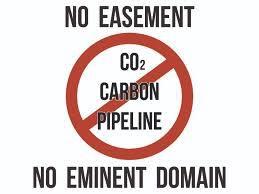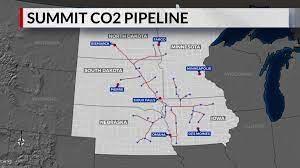 Iowa will introduce legislation preventing pipeline operators from exercising eminent domain unless they obtain 90 percent of their easements under voluntary terms. Summit Carbon Solutions is a leading developer of pipelines that are intended to convey liquefied carbon dioxide from ethanol plants to points where underground sequestration will take place.
Iowa will introduce legislation preventing pipeline operators from exercising eminent domain unless they obtain 90 percent of their easements under voluntary terms. Summit Carbon Solutions is a leading developer of pipelines that are intended to convey liquefied carbon dioxide from ethanol plants to points where underground sequestration will take place.

House File 565 is expected to pass in the Iowa House. It is questionable whether the bill will receive Senate approval, despite the House version having been amended to be more acceptable to the upper chamber. The Bill will allow landowners to be compensated for crop losses in the event of damage during pipeline construction or in the event of a rupture.
Summit Carbon Solutions places a positive spin on the ‘not-in-my-backyard’ opposition by claiming that the majority of farmers are in favor of pipelines that will benefit the ethanol industry and indirectly, corn growers. Admittedly, farmers are in favor of pipelines providing they do not pass under their own acreage. Summit has spent approximately $200 million in payments for upfront easements that are not returnable in the event that pipelines are not constructed.

All three proposed pipeline projects will receive federal funding. The Bill is opposed by the Iowa Renewable Fuels Association that regards the legislation as detrimental to ethanol plants.
The entire question of disposal of carbon dioxide, easements for pipelines and eventually, sequestration raises the question of the disposal of carbon dioxide produced by ethanol plants. In the absence of information on specific methodologies and figures, it must be assumed that the by-product of fermentation is vented to the atmosphere. Carbon dioxide is a greenhouse gas, effectively negating the claims that ethanol is a “clean fuel”.